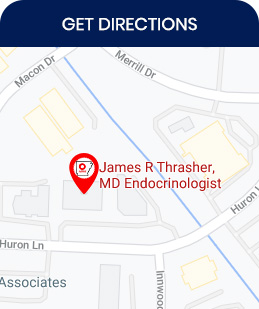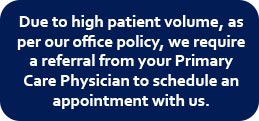How Do I Know if My Blood Sugar is Too High or Too Low?
Recognizing symptoms of high or low blood sugar is crucial for effective diabetes management. High blood sugar may cause increased thirst, frequent urination, and fatigue, while low blood sugar can lead to shakiness, confusion, and dizziness. Monitoring blood sugar levels regularly helps prevent complications and maintain balance. James Thrasher, MD, FACE, and his team are at your service for professional advice at the Arkansas Diabetes and Endocrinology Center. For more information, contact us or schedule an appointment online. We are conveniently located at 11400 Huran Lane, Little Rock, AR 72211.


Table of Contents:
How do you feel when your blood sugar is too high or too low?
Which is worse, low or high blood sugar?
What is a normal blood sugar range for people with diabetes?
How often should I check my blood sugar levels?
The hormone insulin, produced by the pancreas, is responsible for blood sugar regulation. However, when blood sugar levels are either too high or too low, various symptoms can occur and potentially lead to serious health complications.
Hyperglycemia, or excessively high blood sugar levels, can cause a variety of symptoms, including increased thirst, fatigue, blurred vision, and slow-healing wounds, among others. If left untreated, it can lead to severe complications like diabetic ketoacidosis, which can cause symptoms like fruity-smelling breath, shortness of breath, and even coma.
On the other hand, hypoglycemia, or extremely low blood sugar levels, can cause symptoms like shakiness, anxiety, confusion, and rapid heartbeat. Severe hypoglycemia can lead to seizures, loss of consciousness, or even death if not treated promptly.
It’s important to note that symptoms can vary from person to person, and some might not experience any symptoms at all, particularly in the early stages of high or low blood sugar. This is why regular monitoring of your blood sugar levels is crucial, especially if you have a condition like diabetes that impacts your ability to regulate blood sugar.
We offer comprehensive care for patients with diabetes, including regular monitoring and management of blood sugar levels. If you experience any of the aforementioned symptoms, we urge you to seek medical attention as soon as possible to prevent potential complications. Our team of specialists is committed to providing the best care possible for our patients, ensuring their blood sugar levels are properly managed for optimal health.
In cases of low blood sugar, or hypoglycemia, which is characterized by blood glucose levels dropping below 70 mg/dL, our team of experts will provide the necessary care and medication. Hypoglycemia can be triggered by various factors including skipping meals, excessive physical activity without adequate food intake, or an overdose of insulin in individuals with diabetes. Symptoms may include shaking, sweating, hunger, irritability, confusion, weakness, dizziness, seizures, and in severe cases, loss of consciousness. If not treated promptly with glucose, recurrent episodes can lead to brain damage and even become life-threatening.
Similarly, high blood sugar, or hyperglycemia, is characterized by blood sugar levels above 180 mg/dL, usually associated with diabetes. Our specialists at ADEC are equipped to manage this condition which can cause symptoms such as increased thirst, frequent urination, blurry vision, fatigue, headaches, infections, slow-healing wounds, and in severe cases, can lead to a life-threatening condition called diabetic ketoacidosis. Persistent high blood sugar levels, if left untreated, can lead to complications such as heart disease, kidney damage, nerve damage, and vision problems.
The severity of both hypoglycemia and hyperglycemia often depends on how far the blood sugar levels deviate from the normal range, how frequently these deviations occur, and how long they persist. At ADEC, we focus on managing both low and high blood sugar levels and preventing complications through a comprehensive approach that includes a healthy diet, regular physical activity, and appropriate medical interventions when necessary.
Treatment for hypoglycemia often involves consuming sugar, while hyperglycemia management may require increasing insulin dosage, exercising, or changing diet. In severe cases of hyperglycemia, hospitalization may be necessary for intravenous fluid and medication.
At ADEC, we stress the importance of regular blood sugar monitoring for both conditions. We guide people at risk of hypoglycemia to carry glucose tablets or gel, while those with hyperglycemia manage blood sugar through diet, exercise, and medication as directed by our healthcare professionals. Understanding the signs, symptoms, and potential consequences of both low and high blood sugar is essential for proper management and prevention of complications. That is why we are committed to providing you with the best care and education to manage your blood sugar levels effectively.
Our team is dedicated to providing personalized care that takes into account factors such as age, duration of diabetes, type of diabetes, the presence of other health conditions, the risk of hypoglycemia, and lifestyle.
In line with the American Diabetes Association guidelines, we help our patients understand their blood sugar levels and how to manage them effectively. We guide our patients about the optimal fasting blood glucose level before meals and the desirable levels one to two hours after the start of a meal. We also discuss the importance of nighttime blood glucose levels and how to manage them.
At ADEC, we understand that maintaining the blood sugar range can be a challenging daily task due to factors like stress, illness, and changes in daily routine. That’s why we emphasize the importance of regular monitoring of blood sugar levels, following a balanced meal plan, and engaging in physical activities. We also ensure that our patients stay in close communication with us for proper diabetes management.
We schedule regular check-ups to adjust your diabetes management plan as needed, providing advice on adjusting your diet, physical activity, and medication to help you keep your blood sugar levels within your target range.
Managing diabetes effectively involves regular monitoring of blood sugar levels to ensure they remain within the recommended range. It’s a delicate balance, but with the right information and support from ADEC, it’s entirely achievable. Remember, these are general guidelines, and the optimal blood sugar range for a particular individual may be adjusted based on their individual health status and treatment goals. Consult with our healthcare professionals at ADEC to determine the target blood sugar range that is most appropriate for you.
Whether you have type 1 or type 2 diabetes, the frequency with which you need to monitor your blood sugar levels can vary. For those with type 1 diabetes, you may need to check your levels multiple times a day, while those with type 2 diabetes may need to do so less frequently, depending on your treatment plan and severity of the condition.
At Arkansas Diabetes and Endocrinology Center, we offer personalized treatment plans to manage your diabetes effectively. For those on insulin therapy, we understand that frequent monitoring is necessary to adjust insulin dosages based on blood sugar readings. If you’re managing your diabetes with oral medications or lifestyle modifications, we’ll guide you on how to regularly check your blood sugar levels to keep them within your target range.
Your blood sugar history, pregnancy, stress levels, and personal health goals can all influence the frequency of blood sugar monitoring. Our experienced team at Arkansas Diabetes and Endocrinology Center will consider all these factors when helping you determine the ideal monitoring schedule.
We recommend keeping a log or using an app to track your blood sugar readings, so you can identify patterns and understand how different factors affect your blood sugar levels. Regular monitoring can detect trends, adjust treatment plans, and prevent complications.
Consult with our healthcare providers at Arkansas Diabetes and Endocrinology Center in Little Rock to determine the optimal monitoring schedule that suits your lifestyle and health needs. Remember, more frequent checks may be necessary during times of stress, illness, or medication adjustments.
Recognizing the signs of high or low blood sugar is essential for managing diabetes effectively. Symptoms of high blood sugar include increased thirst, frequent urination, and fatigue, while low blood sugar may cause shakiness, confusion, and dizziness. Regular blood sugar monitoring helps prevent complications and maintain optimal balance. For professional guidance, visit James Thrasher, MD, FACE, and his team at the Arkansas Diabetes and Endocrinology Center. For more information, contact us or schedule an appointment online. We are conveniently located at 11400 Huron Lane, Little Rock, AR 72211. In our Little Rock office, we serve patients from across the state including areas such as Little Rock AR, Conway AR, North Little Rock AR, Pine Bluff AR, Hot Springs AR, Benton AR, Sherwood AR, Russellville AR, Jacksonville AR, Cabot AR, Searcy AR, Bryant AR, Jonesboro AR, Forrest City AR, Magnolia AR, Camden AR, Malvern AR, Batesville AR, Arkadelphia AR, Clarksville AR, Monticello AR, Heber Springs AR, Morrilton AR, Stuttgart AR, Greenbrier AR, Sheridan AR, and Vilonia AR. If the commute to Little Rock is too far or difficult we can establish a visit remotely by using telemedicine.







